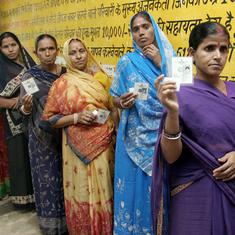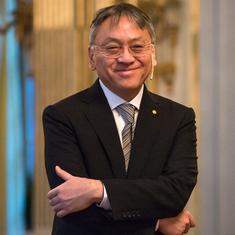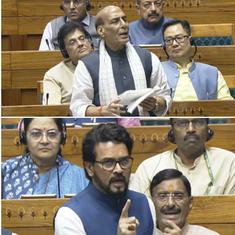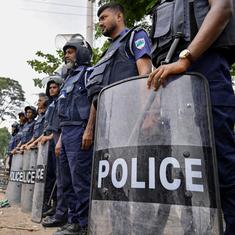Long before we had heard of Laverne Cox, the celebrated transgender star of American TV show Orange is the New Black, Laxmi had appeared on reality television in India, in shows such as Bigg Boss and Sach Ka Saamna. But what she's truly thrown herself into is advocacy and activism for transgender communities - not just for fellow hijras, but for all transgender people.
A fiery figure
At the World Book Fair, Laxmi cuts a fiery figure. One minute she is talking about the advocacy meeting she had at the University Grants Commission, and the next, about her favourite Bollywood song to dance to. Through it all, she embodies the playful and flirtatious energy that hijras often strategically deploy in order to earn their livelihood.
When we meet, she is distracted and tired from the book launch. But she is forever anxious about whether her chelas, who surround us, have eaten, and about her family, who have travelled from Mumbai to attend the launch. However, once she starts talking about her work, you get a glimpse of the activist who stood up to RR Patil against his ban on dance bars.
Transgender rights
Laxmi speaks about the hope generated by last year's Supreme Court judgment acknowledging the equal rights of transgender people. A recent interview with a Human Rights Watch researcher paints a sorrier picture of implementation on the ground, but Laxmi is more optimistic. She says, "It's happening, slowly and steadily. If after some time we see not enough improvement, we'll go back and make sure it happens."
But while Laxmi is appreciative of this work, and of the UGC's work in scholarships for transgender people, she points out the problem of access. Even if a transperson has money, she says, they are discriminated against, and cannot buy a house. They can't walk on the streets without facing violence. Another challenge is access to public health. She is critical of the budget cut for health, and says it affects transgender communities disproportionately.
The new government
Laxmi wants to give the Narendra Modi administration a bit more time. But at least one thing she does want them to do this year is to have a budget for transgender people's welfare. For Prime Minister Modi, her message is: “He is not just the PM of the straight people, but of all the gay people, all the lesbians, all the transgender people, all the hijras, all the sex workers – everyone whose sexuality is still behind closed doors.”
This is a real challenge to the conservative ruling party, which has not really taken a stand on the infamous Section 377, which criminalises certain sexualities, even after repeated requests to do so. Specifically on 377, Laxmi says, “The State has no business interfering with what I'm doing in my bedroom.”
On movements
Laxmi also perks up when we talk about her work in the glamour industry. This leads to a conversation about how much she enjoys her femininity. “I believe I'm a seductress,” she says, laughing, “I'm Cleopatra, Umrao Jaan, Chitralekha, Amrapali, Mastaani.” It is this femininity that she was ridiculed for when she was young, and objectified for throughout her life.
Laxmi says she would like to tell women all over India to love themselves, instead of being constantly preoccupied by the patriarchal demand to only care for other people. But she is critical of the women's movements in India, particularly the influential urban movement. She argues that the latter has become restricted to the elite, and does not consider different kinds of women, such as sex workers or transgender women.
She is equally dismissive of gay people who discriminate against transgender people and crossdressers. ("No TG and CD", read the disclaimers of some party invitations in India's capital.) Laxmi says, "Our movements are inclusive of all marginalisations: we want to work for transgender rights, but also for tribal rights, sex workers' rights, gay and lesbian rights. People who discriminate in this way are not truly activists."
What’s next? Laxmi is planning a book about all the men in her life – those in her family, her lovers, her mentors, colleagues and friends. If the response to this book, first out in Marathi and Gujarati, is anything to go by, it will be a success.










